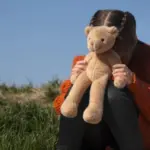Discover what reactive attachment disorder is, how it affects childhood and what consequences it can have for the adult who has suffered from it.

A few months ago I wrote an article about the different types of attachment and how any attachment that has not been secure in childhood can affect adult life. Today, however, I am going to talk to you about what is called reactive attachment disorder how it affects the child, what consequences it has in adult life and what treatment is the most effective.
It is important to remember that the attachment is the bond established between baby and caregiver mainly in the first years of life. Many people think that babies do not know anything and if parents do not provide the necessary care in the first years of life, as in adult life there will be no explicit memory of it, nothing will happen and there will be no subsequent affectation. But it’s not like that. The first years of life will mark the type of bond that the person will establish with others. Your way of relating to your environment will depend on those two years of life where you receive or do not receive affection and care.
What is reactive attachment disorder based on?
During the first years of life the child receives a careless treatment by parents or primary caregivers, there are abuse or neglect This causes the baby to experience the relationship with her parents as a relationship in which there is a lack of security, affection, love and well-being and therefore these basic needs are not covered. If we also add that there is not good care in terms of food, safety, play and physical contact, the repercussions can be even greater.
What are the main causes?
It is normally related to parents who suffer from some type of mental retardation or psychiatric illness, families in which rejection of the baby occurs (for example in single-parent families in which the mother has suffered postpartum depression) or in which the baby is abused. the baby for not accepting it, caregivers who lack parenting skills, children who have many caregivers simultaneously, parents who abuse toxic substances, teenage parents who lack emotional maturation or abrupt and sudden change of primary caregivers (for example (for example, the baby being moved to an orphanage or adopted by a family).
What are the main symptoms in the child?
- The baby/child rejects physical contact with others and rejects the primary caregiver.
- Has difficulties to be consoled It doesn’t seem like anything can calm him down.
- Uninhibited type: He interacts equally with acquaintances and strangers. He does not make distinctions or show rejection or fear of strangers.
- Inhibited type: He is a child who prefers to be alone rather than interact with other people and distrusts everyone.
- Aggression, lack of empathy and ignorance of how their behavior may affect others. They may attack others without showing regret or remorse.
What are the main consequences in adult life?
He attachment cycle is systematically broken The baby’s needs are not met or are done in an inconsistent way and this causes trust to not develop with the parent or main caregiver. When this occurs recurrently, the child grows up in an environment where he/she feels unsafe and in adult life behaviors such as:
- Early bonding indiscriminately with anyone: They are people who tend to consider people they have just met as great friends or with whom they have established a special bond. That sensation is only experienced by the person who received reactive attachment, since on the other hand, that special bond is not established. Therefore, the person may feel rejected or demand too much from the other person and have relationships that go up and down like wildfire. They are people for whom friendships or relationships do not last too long and they consider themselves to be in love.
- Initial mistrust of everyone and social isolation: Both initial total trust (the previous point) and absolute distrust in any person can occur. They may be people who do not trust others despite being shown that they can be trusted. They think people are evil, treacherous, and self-interested. This causes them to behave selfishly and not open up to others, so the relationships they establish are superficial and what they fear usually happens, people end up distancing themselves or they end up betraying them as a result of the selfish behaviors received. As they do not establish bonds of affection, others distance themselves and they experience this as reliable proof that they are right, that no one can be trusted. This can lead them in the long run to social isolation, “better alone than in bad company.”
- Difficulty creating bonds of trust: Whether they are people who bond quickly with anyone or distrustful and somewhat antisocial people, the common trait is that they have serious difficulties creating bonds of trust with others. They do not usually generate healthy friendships or relationships where there is total trust and transparency.
- They are people with a great emotional lability and emotional regulation difficulties: They may be people who show great joy, but anything can set off a spark and cause them to react in an aggressive or depressed way. They are impulsive in behavior and react in unexpected ways.
- Lack of empathy and low tolerance for frustration: They do not understand the impact of their actions on others and act selfishly. They have grown up thinking that they are alone in the world and that is why they seek their own interest even if that means trampling on others. They are people who will do whatever it takes to get promoted at work and will not feel remorse. They can become manipulative people to achieve their goals and they do not feel bad for doing so since they are unable to see the damage they can cause in others.
What can be done in these cases?
These are usually people who end up coming to therapy because they carry with them a great suffering However, they tend to be rigid people who are difficult to work with because they tend to experience these situations as passive victims of what happens to them. Furthermore, mistrust in everyone does not help the process, so getting the person to trust the therapy is essential for a good prognosis. He psychological treatment is usually effective ; By focusing on post-traumatic stress and the person’s childhood, one can understand themselves and change their current connection with others.
If you feel identified with this symptomatology, do not hesitate and seek professional help. You can take control of your life.
Encarni Muñoz Silva
Health psychologist, registered number 16918








